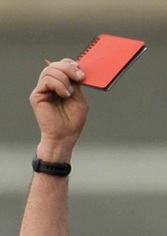the increase, often to the detriment of supporters and TV viewers. As economists, our first reaction is to conclude that the net benefit of fouling must exceed that of not fouling. To deter this, the monitoring of, and penalties for, cynical fouling should be sufficiently high to reverse that trade-off.

The question is whether the black card system will be a sufficient deterrent. This is debatable. For example, if the black card was in operation this season, Sean Cavanagh would only have missed the remainder of game and could have been replaced. Would that have been sufficient punishment given that a clear goal-scoring opportunity was denied and Tyrone won the game by two points?
As with any corrective policy, it is not sufficient to simply impose new regulations or penalties without taking into account how those subject to the regulations and penalties will react. The simplest thing for managers to do will be to not use all of their five permitted substitutes in case their team gets a black card near the end of a game. The biggest fear, however, is that the ‘cynicism’ simply takes a different form. As the penalty to fouling is now higher, it may be in the interests of players to dive or feign injury to con the referee into believing that a foul has occurred in order to reduce the number of opposition players on the pitch. To overcome this, the penalty for such behaviour should be severe and should be aided with use of TV evidence, possibly during the game, and retrospective sanctions. Any player found guilty of diving, for instance, should be suspended for a sizable number of games, say 10, only to be applied during the National league and/or Championship.
Notwithstanding the introduction of the ‘black card’, should the GAA implement even harsher penalties for those found guilty of cynical fouling? If so, what might such penalties be? Economists would argue that the penalty to fouling should increase as the number of fouls increases. One possibility is to imitate basketball and introduce a ‘team foul’ rule. In addition to the current yellow and red cards, and future black card, for individual fouls, once teams commit a certain number of deliberate/personal fouls, let’s say 10, they lose a player that cannot be replaced. To further reduce the incentive to foul, increase the ‘tax’ on fouling as the number of fouls committed increases. For example, once a team loses a player after the first 10 fouls, they lose a second player after a lower number, say 6, of further fouls, and a third player after another 4 fouls. Again, this may not have an effect on cynical play near the end of a game if teams are below their foul ‘threshold’ and have not used all of their substitutes.
The cost of fouling could also be increased by having a complementary benefit for the ‘fouled’ team. For example, after the first ten fouls, each extra foul gives the opposition a free kick from the 45m line or from where the foul is committed, whichever is preferred. After another 6 fouls, the ‘cost’ is increased by awarding the free kick from 30m. After another 4 fouls, a free kick from the 21m line. If cynical fouling persists, amend the foul-number thresholds. Another possibility is to award a penalty kick if a clear goal-scoring opportunity is denied, with the value of a goal scored directly from such a penalty kick greater than the three points for a ‘normal’ goal.
There will doubtless be costs to implementing a scheme similar to that outlined above. There have been numerous recent examples of the GAA adopting a hard-line attitude to fouling but then softening this approach given the number of yellow and red cards issued, complaints by managers, players and supporters, time wasted, etc. As well as that, referees may ‘cop-out’ and review a large number of fouls with TV evidence during a game, thereby taking much longer to complete a game. While it is natural that those most likely to suffer from eliminating cynical play will be loudest in their complaints, it is surely in the long-term interest of the GAA as a whole to eliminate such negativity.
 RSS Feed
RSS Feed